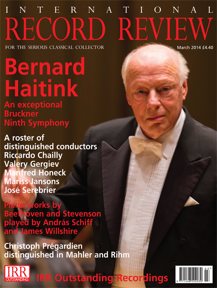Texte paru dans: / Appeared in: |
|
|
Reviewer: Michael Jameson This is the second release in Naïve’s Vivaldi Edition to feature ripieno concertos (more correctly termed concerti a quattro) for string orchestra (without the participation of a solo violin), played by Concerto Italiano directed by Rinaldo Alessandrini. These are stylish and diverting accounts, capably performed and pleasingly recorded, though most of these concertos have little to distinguish them from their immediate siblings. Still, even if Peter Ryom’s exhaustive catalogue of Vivald’s works seems a tad daunting when it comes to sorting out problems of numbering and overall chronology, that lends not the slightest credence to Stravinsky’s suggestion that actually Vivaldi hadn’t written over a thousand concertos so much as rewritten the same one a thousand times over! Alessandrini’s programme doesn’t seem to follow any particular order, however, and one could be forgiven for thinking that most of the pieces assembled here had been selected in piecemeal fashion. Certainly this makes it more difficult to flag up specific rival recordings for the purposes of comparison, and hence I’ll focus on several representative works from this CD , and just one set of rival performances, in the hope that readers will be able to extrapolate from these comments when applied to this issue in a more general sense. In any case, our editor probably wouldn’t thank me if I offered up comparisons for every one of the 11 string concertos heard here, and so I’ve selected Simon Standage’s outstanding recordings with Collegium Musicum 90 for the purpose. No fewer than six of the concertos played by Alessandrini and Concerto Italiano are also included on Volume 1 (‘Paris’ Concertos) of Standage’s Vivaldi string concertos recordings in the Chandos Chaconne series. Though no mention is made of the fact in the rather unhelpful booklet notes provided with the Naïve issue, these works come from one of only four surviving complete manuscript sets of Vivaldi’s music, this one being preserved in the Paris Conservatoire’s collection, and handwritten by the composer’s father. The principal distinction to be made between these two recordings is that whereas Alessandrini uses single string players to each part, Standage and Collegium Musicum 90 use nine violins, and pairs of violas and cellos with a single bass. In addition, and in keeping with period practice, wind instruments and various continuo instruments are also judiciously added at various points, making the Chandos version much the more aurally engaging choice. Recorded back in 1998, Standage’s vital and energetic accounts are not easily eclipsed by this newcomer. In the D minor Concerto, RV 127 there’s persuasive grandeur about Standage’s opening Allegro that conveys the rhetorical power of the music to gripping effect. Later, the intimate exchanges of Alessandrini’s single strings run to 1’13” as opposed to Standage’s 53 seconds in the central Largo, again reflecting the urgency and passion attending his more urgent and exciting account. RV 160 in A major precedes it on the Chandos disc and, much as I admired the verve and buoyancy of Concerto Italiano’s playing here, the overall effect seems less convincing and one misses the larger instrumental forces of Collegium Musicum 90 in the concluding Allegro particularly. The
Concerto in B flat major, RV164 finds the Italian players under Alessandrini
showing their true mettle in an invigorating romp through both outer
movements and there’s much to admire, too, in the improvisatory approach
taken to this, and several other slow movements (which often serve as little
more than bridge passages between the fast outer sections). If anything,
there’s even greater fantasy and mystery about the playing here than
Standage and his team provide. But yet again, the enlarged forces he has at
his command pay off in the brilliant Allegros; with the added enticement of
gloriously full-throated Chandos sonics and superior booklet notes, too,
this disc is an obvious first choice here. RV 128 in D minor can be found on
the second of Collegium Musicum 90’s discs, where another electrifying
account should clinch the decision firmly in Standage’s favour. |
|
|
|
|
|
Cliquez l'un ou l'autre
bouton pour découvrir bien d'autres critiques de CD |
|




